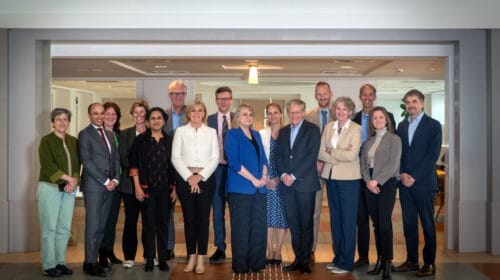INTERVIEW: Why Nigerian artistes can’t get real economic value from foreign collaborations – Music entrepreneur, Chidi Uzoeshi
With almost two decades in the Nigerian music industry, Chidi Uzoeshi, the co-founder of Maze Media, has been involved in the careers of popular artistes like Soul-E, G-Xploits, Sexy Steel, Jah bless and a host of others.
In this interview with PREMIUM TIMES, he talks about the untapped potential of the Nigerian music industry, the downsides of international collaborations and lots more.
Excerpts:
PT: What is your take on the music industry in Nigeria, and what can be done to improve it?
Chidi: The Nigerian music industry is currently a core sector of the Nigerian economy, and words cannot describe how proud we are of the industry’s accomplishments. Still, we must be careful not to sit back and assume we have arrived. If we are to entrench ourselves in the mainstream, there is still much work to be done.
By global standards, the film industry generates more revenue than the music industry, but the reverse is the case in Nigeria, and the reason is simple. Somehow, the music industry made room for managers or administrators over the years. These intelligent people stepped into that role and organised the business, which is almost absent in the film business in Nigeria.

The way to improve the industry is for more business-savvy, business-trained personnel to take charge. The era of “accidental managers” is gradually coming to an end. The Nigerian music industry must employ more technically equipped business managers to compete globally and stay competitive.
PT: Clearly, Nigerian music entrepreneurs and artistes have a lot of learning and unlearning to do.
Chidi: People need to understand that when a song is released, the earning pattern becomes predictable, reliable, and is, therefore, investable.
I will publish a paper titled ‘An Enquiry Into the Economics of Streaming’ in due time. I believe this document will peel away the layers of that onion that covers the sharp practice of the major labels and their publishing concerns.
The real reason songwriters are not being paid their worth is that the three biggest music publishing companies do not advocate for songwriters due to a conflict of interest. The three biggest record companies own the three biggest publishing companies. By current deductions, songs are even more valuable than gold or oil. A classic piece, for instance, is a source of predictable income in an unpredictable world.
PT: Are there models that can be adopted to ensure that musicians get their royalties?
Chidi: In more developed economies, the laws and policies are clear and, to a considerable extent, fully implemented. And the government benefits. By deriving taxes in billions of dollars, areas like intellectual property have propelled many of their countries to first-class economies. Look at what happened during the global pandemic when artistes like Springsteen, Bob Dylan, and Tina turner were selling their music catalogues.
There are global implications if you are involved in the music business in any way, so the royalty factor is a knowledge game. Afrobeats are all over the world. It’s all about improving the human capital resources within the business to guarantee that artistes don’t lose money out of ignorance.
PT: What inspired you to start Maze Media?
Chidi: Stephen Ezihe, a brilliant lawyer and childhood friend, and I founded Maze Media. We were both inspired by the enormous gaps of opportunities we saw in the business and what we perceived as general nonchalance towards what is ordinarily the most lucrative arm of the music business.
For me, the term music publisher has always been a euphemism for someone who collects your money or royalties but adds no value to the song. An example of what I mean is in two categories; the multinational publishing companies have way too many songs and so, in reality, cannot effectively oversee all of them and the independent publishers practise a kind of administration where they only collect what is available and take no initiative to increase the value of the song.
If, for instance, they collect royalties from six radio stations on a song, they make no effort to increase the number of the radio playing that particular song to 10 or 14, which otherwise would increase both the value and revenue attached to the song. Besides, over the last 18 years, I have witnessed an unprecedented knowledge gap among artistes and executives alike in a segment of the music business that is otherwise the most lucrative.
PT: What is your take on the trajectory of Nigerian music concerning the increased collaborations with foreign artistes? Is it suitable for the industry?
Chidi: Increased collaborations between Nigerian artistes and their foreign counterparts are a good step in the right direction. But we must consciously focus on being more efficient regarding the business and less on the flash.
Nigerian artistes collaborate with foreign artistes, which raises their brand equity continentally in Africa and their already established camps of fan base across the world. But the real essence of these collaborations is to get more mainstream acceptance and get plays on American and European radio, which most of the time is not accomplished because many of these collaborations are done without “clearance” from the labels of the foreign artistes.
Without clearance, Nigerian artistes can’t get the real economic value of these collaborations. Politics is essential to any business, and we must learn the ropes and play the game.
Also, we must close the business gap between our independent labels and the multinationals. To sustain the scaling of our global prominence, we must get into bed with multinational companies through joint ventures or outright artiste deals with the majors.
PT: What advice would you give to the young artiste who wants to sign with a record label? What should they look out for to avoid conflict with the label in the future?
Chidi: Globally, we are in an era where many people champion artists’ independence. Nigerian artistes cannot afford that luxury. In this era of TikTok sensationalism, artistes must not be carried away by the hype. They need the suits to get them through the maze of the business. I advise any artiste who wants to sign with a record label to ensure they have a seasoned manager representing their interest or a lawyer so the contract’s implications are well spelt out and the agreement is signed in good faith.
The lawyer or manager will also be able to advocate for clauses that can get the labels to keep to every promise made in the contract within the time frames agreed upon. More important than the contract, the artiste must be disciplined and focus on why they were brought to the table. They need to understand that they are in debt once the label starts spending money and that debt needs to be paid back for them to flourish as artistes.
They should also take their time now and then to read about the business, so they have a basic understanding of it, which is a start. The conflict between artistes and labels is not suitable for investment indices in the industry…it could be better for everyone.
PT: What is your mission in music?
Chidi: I plan to become the most disruptive man in music. Music overcomes times of crisis; it is remarkable that we listen to it no matter what happens. I run what is called a music intellectual property investment company.
Hit songs and art, in general, have real value to them. People don’t recognise that when a piece becomes a hit, its earning pattern becomes predictable, reliable, and, therefore, investable.
All these proven songs are as valuable as gold or oil. In the next 14 months, I will administer a catalogue of more than 5000 songs, of which approximately 2000 would have been number-one hits anywhere in the world.
Support PREMIUM TIMES’ journalism of integrity and credibility
Good journalism costs a lot of money. Yet only good journalism can ensure the possibility of a good society, an accountable democracy, and a transparent government.
For continued free access to the best investigative journalism in the country we ask you to consider making a modest support to this noble endeavour.
By contributing to PREMIUM TIMES, you are helping to sustain a journalism of relevance and ensuring it remains free and available to all.
TEXT AD: Call Willie – +2348098788999
<!—-> <!—->








